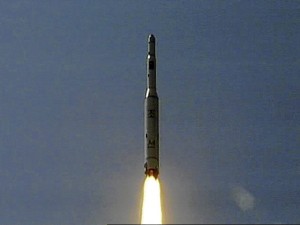
a rocket lifts off from its launch pad in Musudan-ri, North Korea, in this April 5, 2009 image from KRT video.
A no-fly and no-seafaring zone will be declared over a wide area off northern Luzon from April 12 to 16 when North Korea is scheduled to launch a long-range missile.
Between 5 a.m. and 1 p.m. during the period, all kinds of aircraft, sea vessels and even small fishing boats are prohibited from an area 190 nautical miles (352 kilometers) northeast of Sta. Ana, Cagayan, and 150 nautical miles (278 km) east of Polilio island, Quezon.
The area falls under the flight path announced by North Korea for its missile launch.
Government agencies under the National Disaster Risk Reduction and Management Council (NDRRMC) came up with the plan at a meeting on Tuesday.
In case there is danger of rocket debris falling on land, affected residents will be given warning to take cover, said Benito Ramos, executive director of NDRRMC.
“There is nothing we can do about it. We will be on the look out and we seek cover, because we cannot shoot down a missile,” Ramos said.
Diverted to other routes
About 20 international daily flights to and from Japan and South Korea would be diverted to other routes during the no-fly zone period, said Ferdinand Tienzo, assistant chief of air traffic control at the Civil Aviation Authority of the Philippines (Caap).
North Korea said the missile launch was intended to place an observation satellite into orbit. But the United States and other nations critical of the launch believed it was a test for a future long-range nuclear missile.
In an interview, Defense Secretary Voltaire Gazmin said the government was taking the issue seriously as North Korea had no record of a perfect missile launch.
Quoting official reports from North Korea, Gazmin said the second stage of the launch would have the [three-stage Unha] rocket separate and fall into the sea 190 km east of northern Luzon.
If it overshoots…
“We assume this is a perfect launch. But North Korea has not been successful in its previous operations so it might deviate left or right. If it overshoots, it will enter our land area,” Gazmin said.
Ramos said the provinces of Camarines Norte and Catanduanes could be hit by debris if the North Korea missile overshoots.
“So what do we do? We get out of the flight line. If it disintegrates, we do not know how big the debris,” he said.
Ramos said should any debris fall on land, residents should not touch it but inform the Philippine Nuclear Research Institute instead.
Shoot down missile
Given Japan and South Korea’s resolve to shoot down the missile when it enters their airspace, Ramos said the missile may likely have already disintegrated before it reaches Philippine airspace.
“So before it reaches us, we’re clear … But in the event that (the missile) gets through, the decision through the recommendation of the concerned agencies is to have a no-fly zone and to prohibit ships from traveling,” Ramos said.
He said the Caap would announce to airlines and private aircraft the exact coordinates of the no-fly zone. Sea-faring vessels will also be informed about the no-sea travel path.
Fishermen
Ramos said fishermen are not be expected to know the exact coordinates of the no-sea travel zone.
He asked them instead not to venture out to sea from April 12 to 16 in the areas of Batanes province, the Calayan group of islands, the Babuyan group of islands, Aparri, Baler, Casiguran, Polilio and the coastal towns of Isabela province.
North Korea is reportedly planning to launch its missile between April 12 and 16 between 7 a.m. to 12 p.m. (between 6 a.m. to 11 a.m. Manila time).
The Caap plans to implement the no-fly zone from 5 a.m. to 1 p.m. Manila time, or an hour before and two hours after the launch, from April 12 to 16.
Notice to airmen
In a notice to airmen (Notam) it issued on Tuesday, the Caap said the airways to be closed for aircraft operations are A582, A590 and R597.
Caap said the closure would affect air carriers going to Japan and South Korea, including Philippine Airlines, Korean Air, Japan Airlines, All Nippon Airways, Singapore Airlines and Garuda Indonesia.
Joy Songsong, Caap spokesperson, said the affected air carriers were given the option to continue their flights to and from Japan and South Korea but using a longer route.
“Affected carriers have the option of using the Mevin airway, which is a longer but much safer route to and from Japan and South Korea,” she said.
Relying on US info
Gazmin said the government was relying on the United States to provide it with information about the path of the rocket launch.
“The Americans gave us the assurance that they will provide us the necessary information. Japan has already declared it will shoot down the rocket once it passes through its territory. I have talked to one minister from the South Korean government and they will do the same if it will pass through their territory,” he said.
The Philippines, which has no capability for air defense, has joined other nations in urging North Korea to drop its plan.
“Based on historical facts, North Korea does not listen to the majority,” Gazmin said. With reports from Tina G. Santos and Norman Bordadora

